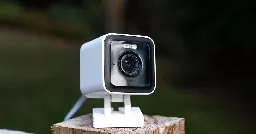Wyze security camera owners reported that they could briefly see feeds from cameras they didn’t own
Wyze security camera owners reported that they could briefly see feeds from cameras they didn’t own

Your Wyze webcam might have let other owners peek into your house


Cameras connected to the public internet are such a bad idea.
No it isn’t! - CIA
Wait, isn't every camera public? - NSA
Agreed! -CCP
Wyze cameras phone home to China unfortunately.
There used to be a website with a map and you could see all these open unsecured cameras they'd found around the world. Mostly by searching Google for the page name they all had.
Some of them seemed intentional, like traffic cams, cameras on the roof looking out over the city, etc, but there were so many fat men sat around watching TV in their underpants, random families in the kitchen, and so on.
http://www.insecam.org/ is still alive!
It would be fine if the footage was end-to-end encrypted, meaning you need to transfer the encryption/decryption keys from device (e.g. a phone) to camera, and then manually between all devices that should have access to the decrypted footage.
Camera would only ever send out encrypted footage, and thus it would be insufficient to have access to the cloud account if you want to view the footage - you would need both access to the account (to obtain the encrypted data) and the decryption key (to actually decrypt it). The decryption key must never reach any 3rd party servers and can only be manually transferred between devices that should have access.
There are still possible attack vectors, like malicious firmware updates, or the viewer client app updates, but those are very difficult to exploit, and pretty much exist in most "secure" software today (including from companies like Google, Apple, Meta, etc.). They could be mitigated by hardware design (do the encryption in hardware, camera's software never has access to decrypted footage) and open source viewer clients that the user controls, but I would consider a camera sufficiently secure (for non-sensitive locations) without those.
How would I encrypt an rtsp stream so I can port forward it and then how to I unencrypt that stream for use on a local server?
It is a bad idea. On one hand, we have the mean to make them quite secure. There is no such thing as an unbreakable encryption, but with proper key management and using decent enough algorithms we can totally do something that puts your camera out of reach of most thing that are not nation-scale organisations. On the other hand, it's mildly more inconvenient than "installing an app and entering your email", as it might require stuff like doing a tiny little bit of setting up.
So, the unsecure/"trust the service" way it is.
What are the alternatives?
A local NVR, like Frigate or Blue Iris.
A camera not connected to the public internet.
I’d argue that it’s more convenient to have clouds connect for recording and storage purposes but so many cameras come with SD cards built in now that the cloud storage isn’t even really an advantage anymore either.
A security camera with only local storage has a pretty obvious flaw that the incriminating footage can be more easily stolen and/or destroyed by the perpetrator.